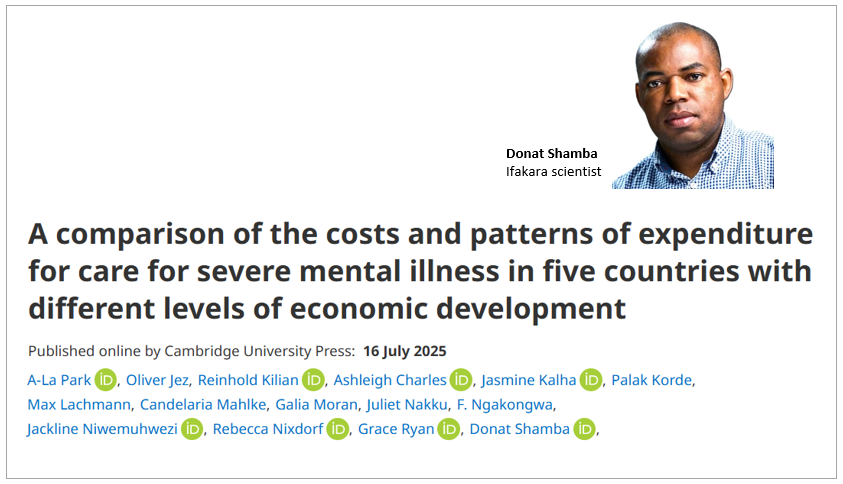
MENTAL HEALTH: Study finds gaps in cost of care across Europe, Asia and Africa

People living with severe mental health conditions face massively different treatment costs depending on where they live, a new international study has revealed. By comparing data from Germany, Israel, India, Uganda, and Tanzania, the study found major disparities in how much countries spend on mental healthcare, with low-income nations like Tanzania spending significantly less than high-income countries like Germany.
The research, whose results were published on Epidemiology and Psychiatric Sciences this month, is the first of its kind to use patient-level data to analyze the costs of illness (COIs) for people with severe mental disorders across countries with varying income levels.
A-La Park from the London School of Economics and Political Science in the UK led the study, with contributions from experts drawn from six countries, including Donat Shamba from Ifakara Health Institute in Tanzania.
Why this study matters now
As mental health continues to rise on the global health agenda, this study shines a spotlight on the inequities in access and funding around the world. It underscores the urgency of building systems that are not just affordable—but fair and responsive to patients’ realities.
Huge cost gaps between countries
A total of 615 participants were tracked for six months, using data from the UPSIDES (Using Peer Support in Developing Empowering Mental Health Services) study, which supports better mental health care using peer support.
Researchers documented their use of medical and psychosocial services with results showing expenditure on mental health to be generally low—particularly in low- and middle-income countries.
Hospital-based vs. Community-based care
In all countries studied except Germany, mental health accounts for less than 4% of total health expenditure, despite the significant burden of disease. On average, mental healthcare in Germany cost more than 33 times what was spent per person in Tanzania, based on 2021 international dollars.
The study also found that in both Germany and Uganda, most mental health spending went to inpatient care—over 70%—suggesting a heavy reliance on hospital-based treatment. In contrast, Israel had the most balanced system, with only 15% of costs going to inpatient care and most directed toward community-based and primary health services.
Income doesn't predict system design
Interestingly, national income levels were linked to overall spending on mental health, but not to how that money was used. For example, despite Germany's high spending, much of it went to inpatient services, while Israel prioritized outpatient and community care.
This variation even among wealthier countries suggests that policy and system design—not just available funds—play a key role in shaping mental health service delivery.
Who spends more—and why?
The study also uncovered patterns linked to gender, age, and diagnosis.
- In Tanzania, female patients incurred lower treatment costs than males.
- In India, people with depression had lower costs than those with schizophrenia, likely due to the complexity of treatment needs.
- In Tanzania, older people had slightly higher costs, increasing by about 3.6% for every additional year of age.
However, researchers found no clear link between a person’s level of social disability and the cost of care, pointing again to the role of access and system design over clinical need.
A call for smarter investment
Despite the rising burden of mental illness globally, mental health remains underfunded—especially in low- and middle-income countries where it accounts for less than 4% of total health spending.
The study emphasizes the need for countries to invest more in primary and community-based mental health services, which are often more accessible and cost-effective than hospital-based care.
“National income is correlated with the total cost of illness in people living with mental disorders,” the authors write, “but is a poor predictor of how expenditures are distributed across sectors.” They call for further research into how spending patterns affect treatment outcomes and service quality
Read full publication here.
